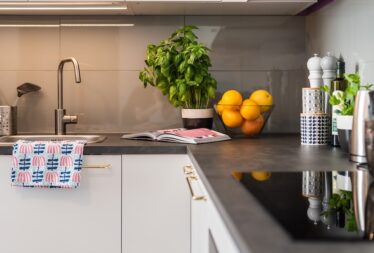“Katowice Is My Home Now” – Get To Know The Story of Vira
Vira came to Katowice more than six years ago to study. She decided to stay in Katowice and develop her career. We talk in Polish, mostly about Katowice and Poland, but our meeting topic is universal for all foreigners looking for their place in the world. Read about Vira’s beginnings in Poland, what she thinks of our mentality, and her plans for the future.
Vira is currently employed in the HR department at the University of Silesia in Katowice, where she plays a key role in implementing the “Welcome2US” project, aimed at supporting foreign employees at the University of Silesia. It’s funded by the Polish National Agency for Academic Exchange (NAWA) under the “Welcome to Poland 2022” program.
Edyta, Wellcome Home: Let’s start with the simplest question: why Katowice?
Vira: First, because my friend already lived and studied here. She gave me many positive recommendations, so I chose Katowice instead of Cracow or Warsaw.
What did you study?
Marketing. Since I already had a bachelor’s degree in marketing in Ukraine, continuing these studies in Poland was the natural choice.
You completed your studies at the University of Economics, and then what?
Life… work, further studies. Last year, I completed postgraduate studies at SWPS in User Experience and User Interface. It’s great that there are such opportunities, and you can study such fields here in Katowice.
How do you assess these studies?
It was a great experience. Firstly, the structure of this course was quite specific compared to the classic organization of studies. We didn’t have typical exam sessions each semester. We worked on tasks during our studies, and the final project was a mobile application. Of course, there were exams, but these studies gradually introduced us to the design process. I’m satisfied with them because they allowed me to understand the entire design process.
I’m glad you’re satisfied. Now you work at the University of Silesia. How did you end up there? What do you do there?
My professional adventure began when I came across a job advertisement that stood out with the promise of rich growth opportunities. Interested, I sent my resume, then went through the recruitment process and was eventually selected to join the team!
Can you tell us more about this project?
The project is aimed at supporting academics from abroad. Its implementation involves the creation of places like our Welcome Point at universities to facilitate their adaptation and integration into the new academic and cultural environment in Poland. With funding from the Polish National Agency for Academic Exchange, the project offers many development opportunities, both for the universities and the employees, opening up new professional and personal perspectives.
Does being a foreigner yourself help you at work? Do you better understand the needs of these people?
Of course. I have an experience that every foreigner who comes to a new country goes through. It’s an adaptation experience that was difficult for me at some point, which gives me an awareness of what they are going through, and this helps me understand their needs better.
What was the most difficult part of adaptation, then?
Immigrating to any country (whether Poland, Germany, or US) always goes through four stages. The first is the honeymoon phase: everything is simply great. We treat our move as an adventure, something new. At that time, our bodies are filled with hormones, so naturally, we don’t pay attention to the negative things. We’re constantly engaged in something. The next stage is a cultural shock: reality appears in true colors. This stage varies for everyone and looks different. It depends on whether a person is introverted or extroverted, whether they naturally adapt easily to change. Then there is acceptance, and finally adaptation. I came for studies and was always surrounded by people, so my honeymoon phase lasted quite a long time, and the first cultural shock came to me after four months. If you come to work, your environment is rather closed, and your role is more task-oriented.
We, Poles, often tend to judge ourselves very harshly. We underestimate our communication and language skills. And foreigners I talk to tell me something completely different. Having experienced this, do you think Poland is a difficult country to adapt to for foreigners?
Hmm… That’s a good question. Ukraine and Poland have a similar history and mentality, so it’s hard for me to see a big difference. For a long time, various historical and political factors influenced this, which didn’t allow people to be open to others, speak honestly about their opinions, or boast. Such behaviors, also brought from our homes, develop defense mechanisms in us, which affect a certain reserve in our behavior. It’s also something interesting and unique compared to other cultures. After all, you can’t pretend everything is colorful and the sun always shines. A healthy balance is needed.
I think you’re right. We, Poles, can’t just say, “I’m happy with my life, I like my job, I earn enough.” Hence, the stereotype of Poles is that we are shy and reserved.
But if you don’t say good things about yourself, no one else will. So it’s another aspect of development. It takes time to stop, reflect, and think: “Yes, everything is fine.”
Who do you usually spend time with? Who are your friends? Are they Poles, or are they more foreigners?
It depends. There are people from Poland, there are people from Ukraine. I have friends from different countries.
Do you more often make friends with someone you meet at work or university, or are these people from your studies? In your opinion, what’s the easiest way to make friends?
I have friends both at work and outside of it. I have some advice for people who come to Poland: you can’t just close yourself off and stay at home. You need to quickly minimize that cultural shock and just start going out.
In Katowice, there are many meetings for foreigners, for example, Wednesday international meetups at Królestwo. You can meet cool people, and chat in any language in the world. There are meetings where people only speak Spanish, and the same goes for German.
You only need to join these groups because other foreigners are also looking for friends and feel lonely. There are plenty of opportunities, and it’s worth exploring what Katowice has to offer.
You speak Polish beautifully, and being Ukrainian, it was probably a bit easier for you to overcome the language barrier. Many foreigners don’t even plan to learn Polish because it’s not their place for good. Is it possible to establish good relationships, assimilate, and overcome this cultural shock without knowing Polish?
I sincerely believe so. And with each passing year, that probability increases. The level of English education in Polish schools is improving, and most of young people speak English. Also, more and more older people start speaking. Establishing relationships with Poles isn’t a problem, even if you only speak English. For Poles, it’s a great opportunity to practice their English.
Could the language barrier be a problem for the employees of your university in any way, at any stage?
No. As a university, we organize training for our foreign employees in English. In Katowice, more and more serious conferences and events take place in English. It’s not a barrier; Poles just need more time for the process.
It’s also a generational change. Even if we know English, we still feel ashamed to use it. It’s probably a matter of our reserved attitude. But if you gain our trust, we can be very open and hospitable.
Yes, that’s true. In my opinion, it’s not worth changing for some foreign standards. Just because people behave a certain way elsewhere doesn’t mean we have to do the same. It’s a cultural aspect. Is it worse? No, everything’s okay, it’s just how it is and it’s ok.
I’d like to ask about one aspect that is important from the perspective of what we do at Wellcome Home – flat rental. You’ve been here for almost seven years, so you’ve probably experienced various scenarios when it comes to renting. Where did you live during your studies? What was it like for you to “settle down”?
As a student, I had the opportunity to live in a dormitory. Then, when it was time for my place, my friend recommended Wellcome Home to me. She spoke highly of your apartments, so I followed her recommendation and didn’t have to search traditionally, through rental platforms.
Based on your experience or that of your friends, is there something that foreigners expect in an apartment? What is important for someone moving from another country?
It’s worth remembering that someone who comes to another country (Poland or any other) doesn’t have “another” home. They won’t just go to their mom’s place for the weekend, so they treat this apartment as their kingdom. It’s their home. The basic amenities are important because you won’t bring your pots and pans. What are you going to do with them when you move again? Throw them away? It’s a matter of convenience, but also a conscious and ecological approach for both sides.
You won’t go to your mom’s to do laundry, either. You simply have to manage on your own, so that’s why full equipment is so important. Where do the employees of your university usually live?
The University of Silesia offers various solutions because we have departments in different cities: Sosnowiec, Chorzów, Katowice, Cieszyn. Our university offers accommodation where our employees can live, but if someone comes with a family, which also happens, they often look for housing on their own.
Does the university cover the accommodation costs of employees?
It varies. It depends on the contract.
You’ve been here long enough to see how Katowice has developed. What do you think are the biggest revolutions that have happened in Katowice?
I would say that the most important thing is that this change is ongoing. It’s not like something was changed, a major renovation was done, and that’s it. The city is constantly evolving and constantly surprising with something new.
As you live longer in Katowice (as in any place in the world), you tend not to notice these changes over time. But after talking to my friends who haven’t been in Katowice for six months, I realized it again. The public transport system is great, the city bikes too.
Another thing is that the center of Katowice looks a bit like New York now 🙂 Skyscrapers and office buildings are being built, and there’s an energy that attracts. There are people, movement, new investments.
What are your favorite places in Katowice? What would you recommend?
It depends on the purpose. If someone is coming just for a few days, they can visit the Culture Zone and the Silesian Museum. And of course, take a stroll through the beautiful Modernist Architecture Trail in the city center. If someone wants to stay longer and relax, Katowice is a great place because it’s very close from the city center to the parks. We have Park Kościuszki, Park Śląski, and the Dolina Trzech Stawów [Three Ponds Valley]. And if going to Park Śląski, you can also visit the renovated Planetarium. And then, spend the evening in the city on Mariacka Street.
How do you spend your free time, evenings, and weekends?
I like the fact that in Katowice, there are many opportunities for active leisure. There are swimming pools in various parts of the city. You can also go for a run in numerous parks. I like that Katowice is ideally located. It takes me 2 hours to get to my friend in Wrocław. I can reach Kraków in an hour, and Warsaw in 2.5 hours. Recently, I was in the mountains. I think that’s Katowice’s biggest asset – its location. Sometimes you can waste an hour in traffic, but here, in an hour, you’re in the mountains and you can go hiking.
How do you spend holidays and all longer breaks from work?
I wouldn’t want to be boring and say that I work… so I tell myself: “Make use of this time!”. I try to travel.
What are your favorite places in Poland? Or those you’d like to discover because you haven’t had the chance yet?
Last summer, I discovered Sopot. Beautiful city and the sea. It wasn’t exactly peaceful, but it’s a place worth seeing. I also like Zakopane, but not the city itself, but rather the mountain trails. It’s worth choosing a time when there aren’t so many tourists and just go for a walk.
Do you see yourself staying in Katowice permanently? Or do you think that today it’s Katowice, but tomorrow it could be anywhere else?
I had such an experience. I lived in Greece for six months, and it was a beautiful time of my life. But I came back to Katowice, and I like it here too. We all know that life is unstable, and we can’t be sure what tomorrow will bring. Will I stay in Katowice? Great. Will I move to Australia? That will be great too. It’s not even about me, but about how the world is changing now, and that people have to learn to be flexible. It’s a new norm, and there’s nothing wrong with it. It’s just worth being open to the world, to people, and opportunities.
You have a lot of wisdom. I hope that Katowice gives you everything you need and that you feel at home here.
Thank you very much. The part of Greece where I lived was a bit like a grandmother’s place, where it’s always nice to drop by, relax, and eat good food. But Katowice is like a mother. Everything that is important to me and what I need now is here.
That’s the perfect summary of our conversation. Thank you very much!
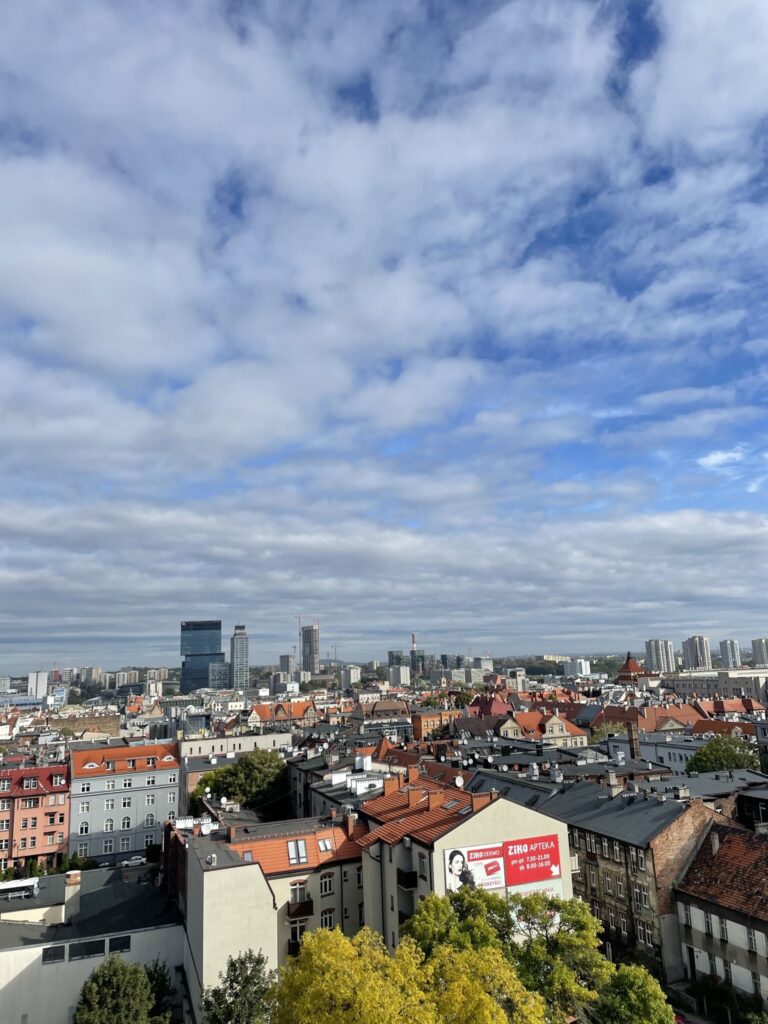
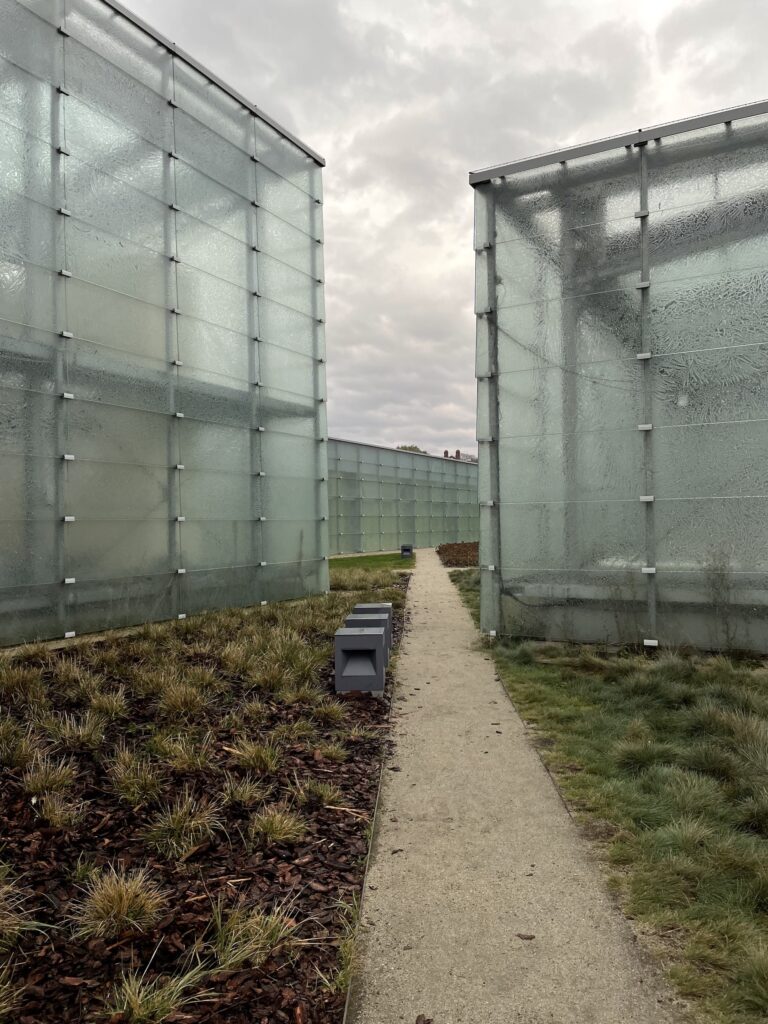
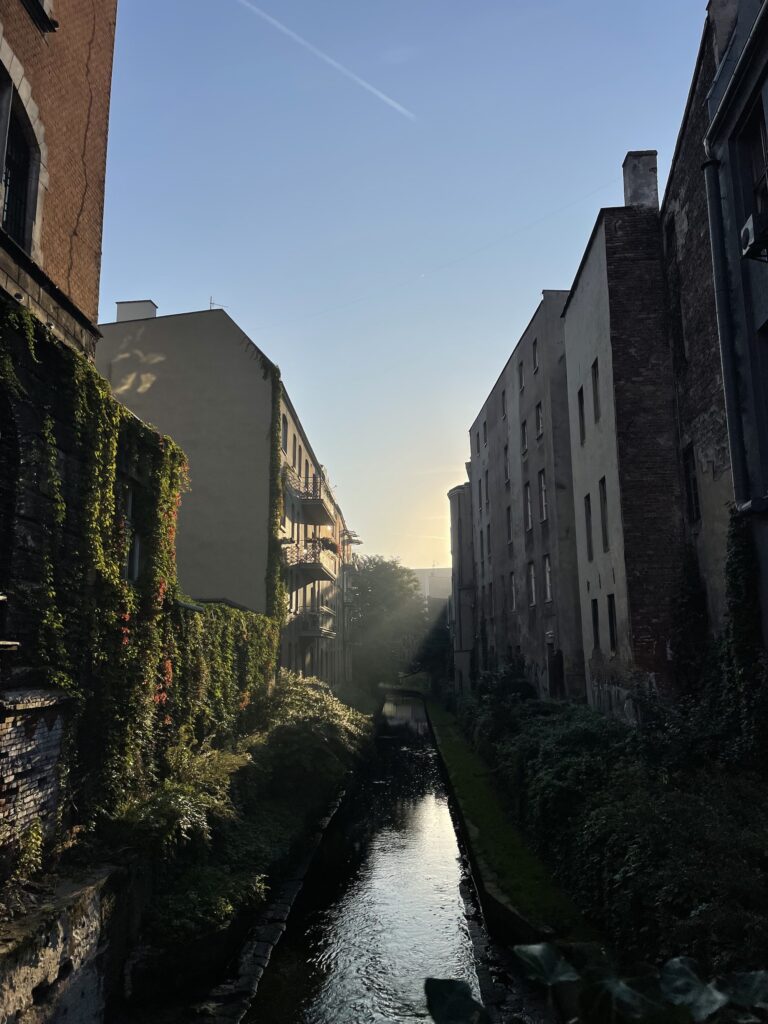
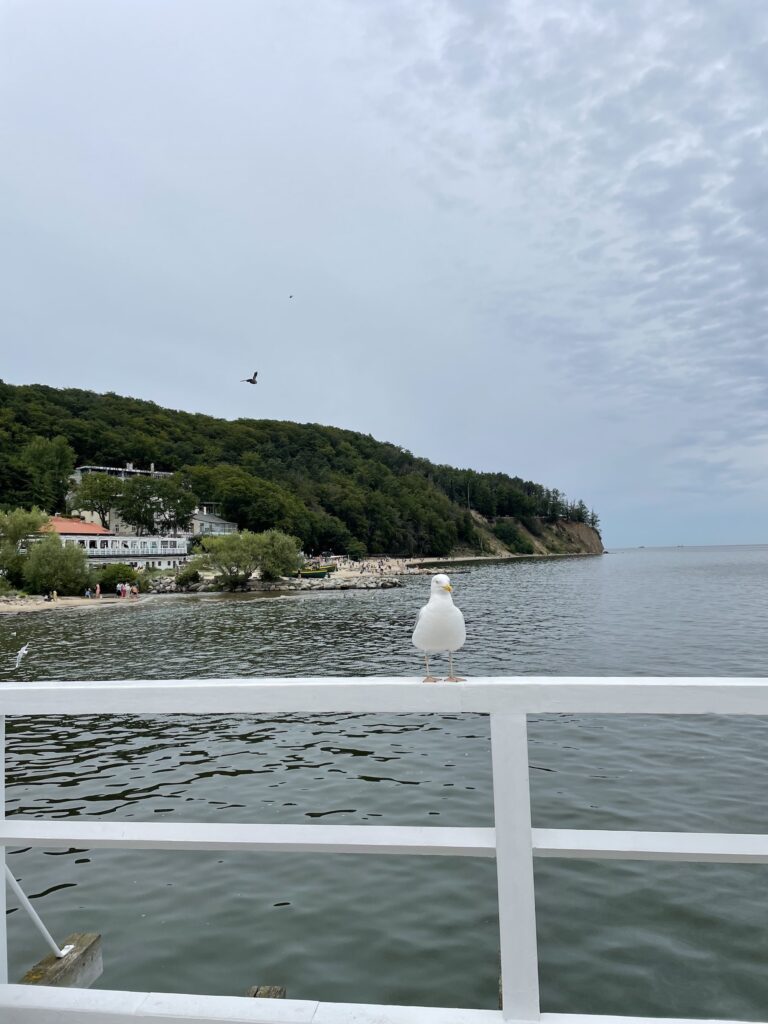
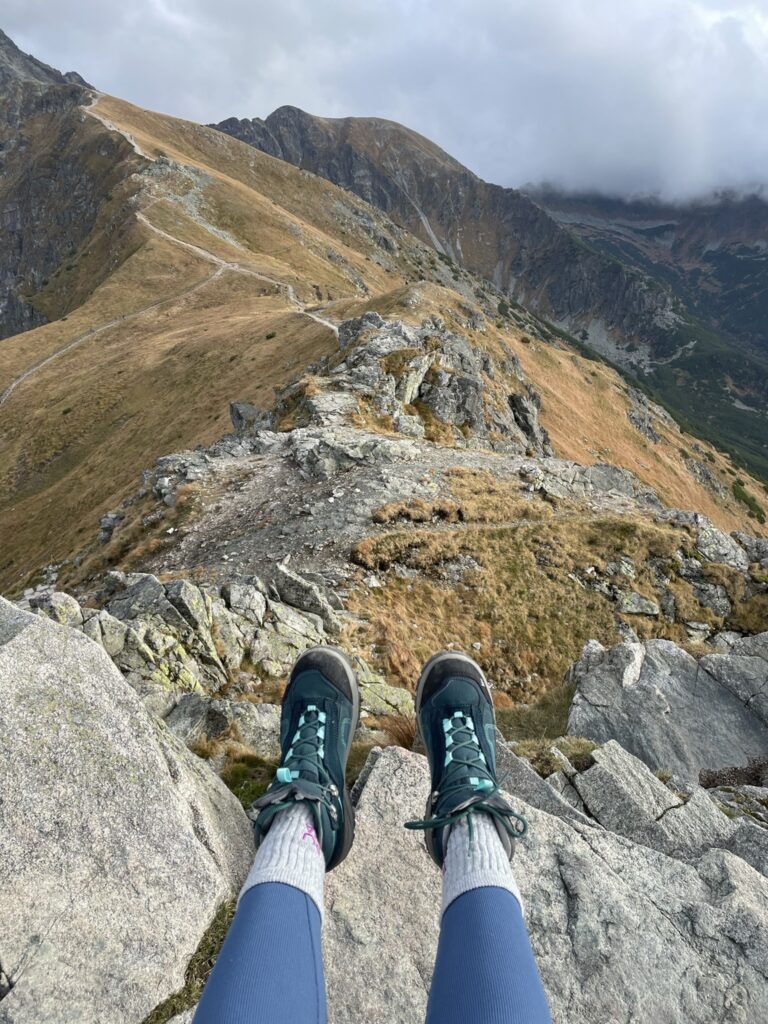
1. Admire Katowice from the top of the cathedral;
2. Stroll around the city center and walk by the Rawa River;
3. Visit the Silesian Museum;
4. Go to Sopot and meet seagulls;
5. See Tatra Mountains from the top of Kasprowy Wierch;
